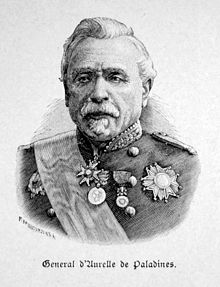Louis d'Aurelle de Paladines
Louis Jean Baptiste d'Aurelle de Paladines (born January 9, 1804 in Malégieux , Lozère , † December 17, 1877 in Versailles ) was a French general .
Life
Trained at the Saint-Cyr Military School , Aurelle joined an infantry regiment in 1824 as a second lieutenant and served from 1841 to 1854 with a brief interruption in 1849, where he took part in the campaign against Rome, in Algeria , where he received an award for being the first to serve in 1852 Proclaimed empire, was promoted to brigadier general.
During the Crimean War , he distinguished himself during the Battle of the Alma (September 20, 1854) and the Battle of Inkerman (November 5, 1854), and commanded a brigade outside Sevastopol . In 1855 he became a division general and commanded in 1859 in Marseille. Transferred to the reserve in 1869, he was only given command again by the republican government after the day of Sedan on October 11, 1870 during the Franco-Prussian War . After he had commanded for a time in Marseilles, he was placed on October 14 at the head of the newly formed Loire Army .
He organized these with care and energy and proceeded northward to relieve Paris. On November 9, 1870, he pushed the Bavarian General von der Tann back at the battle of Coulmiers . But he refused to advance on Paris until the reorganization of the army was complete. After political pressure from the government, he went on the attack at the end of November. Pressed from the east by the army of Prince Friedrich Karl Nikolaus of Prussia , he was beaten with heavy losses by the army department of the Grand Duke of Mecklenburg in the Battle of Loigny and Poupry on December 2, 1870 , and had to give up Orléans on December 5 .
Although Gambetta was largely to blame for this defeat through his unauthorized intervention in the military operations, Aurelle alone was made responsible for the accident and relieved of his command on December 6th. In January 1871 he refused the command of the Cherbourg camp that had been proposed to him, was elected to the National Assembly, spoke here for peace and was a member of the commission that brought about the preliminary negotiations ( preliminaries ) for an armistice with Prussia.
At the beginning of March 1871 he commanded the National Guard of the Seine department, and since the Peace the 14th Territorial Division in Bordeaux. In 1876 he was elected to the Senate. He died in Versailles on December 17, 1877.
Works
He wrote in his justification:
- Campagne de 1870-71 ;
- La premiére armée de la Loire (Brussels 1872; German, Braunschweig 1874–1875, 2 volumes)
| personal data | |
|---|---|
| SURNAME | Aurelle de Paladines, Louis d ' |
| ALTERNATIVE NAMES | Aurelle de Paladines, Louis-Jean-Baptiste d ' |
| BRIEF DESCRIPTION | French general |
| DATE OF BIRTH | January 9, 1804 |
| PLACE OF BIRTH | Malégieux , Lozère |
| DATE OF DEATH | December 17, 1877 |
| Place of death | Versailles |

